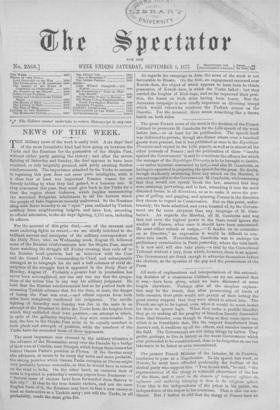The great French nova of the week is the decision
of the French Cabinet to prosecute M. Gambetta for the Lille speech of the week before last,—or at least for it publication. The speech itself was delivered in private, though at a dinner where over a hundred guests were present, but it was published at once in the Republique Francaise and copied in the Lille papers, as well as in almost all the other journals of France ; and the publication of these "insults against the Government" is said to constitute the offence for which the manager of the Re'publique Fran wise is to be brought to justice, —or rather injustice warranted by law,—and also M. Gambetta, as having co-operated in preparing the speech for the press. No doubt, though studiously abstaining from any attack on the Marshal, it was not respectful to the Government. M. Gambetta, whileassuming that they would not openly break the law, asserted that they were straining, perverting, and in fact, wrenching it into the most distorted forms, in all directions, so as to make it serve the pur- pose of galling, and gagging, and spurring France in the direction they choose to regard as Conservative. But on this point, unfor- tunately, the facts admitted, and even boasted of, by the Govern- ment are far more eloquent than any language of M. Gam- betta's. As regards the Marshal, all M. Gambetta said was that not even the highest power in the State could ignore the verdict of France, when once it should have been announced. He must either submit or resign,—" Ii faudra ou se soumettre ou se ddmettre," an expression it would be difficult to con- strue into insult. Nevertheless, Gambetta was to undergo his preliminary examination in Paris yesterday, where the trial itself, it is now said, will also take place,—a trial by the Correctional Tribunal without a jury, from which, however, there is an appeal. The Government are frank enough to advertise themselves before the electors, as the apostles of the gag and the persecutors of the Press.






























